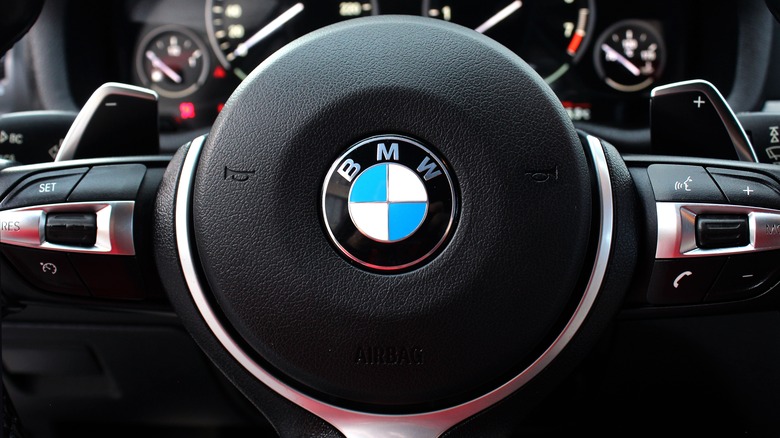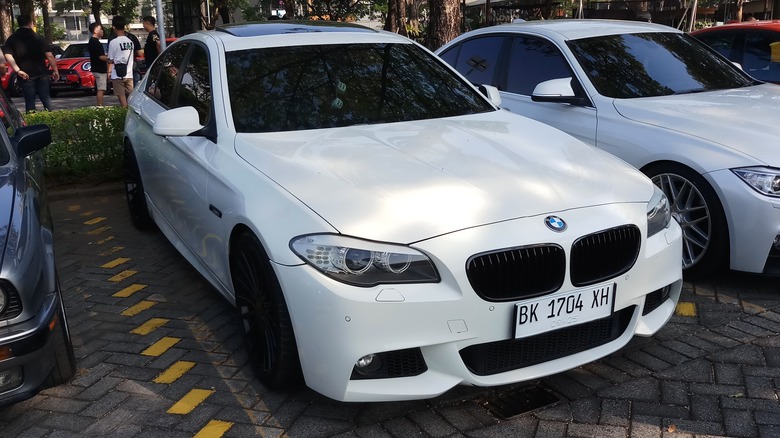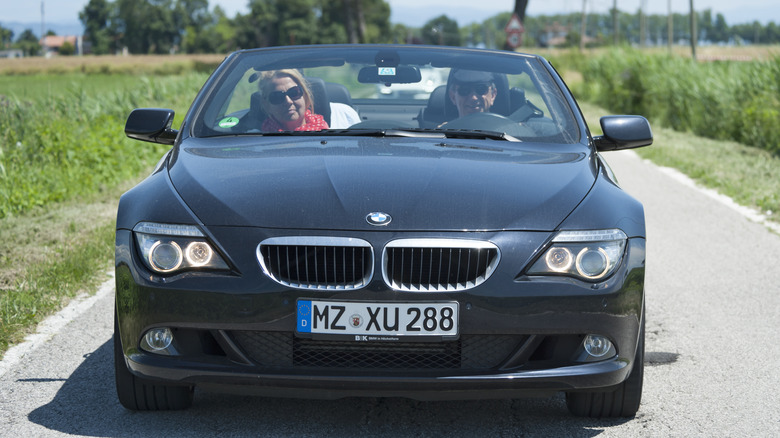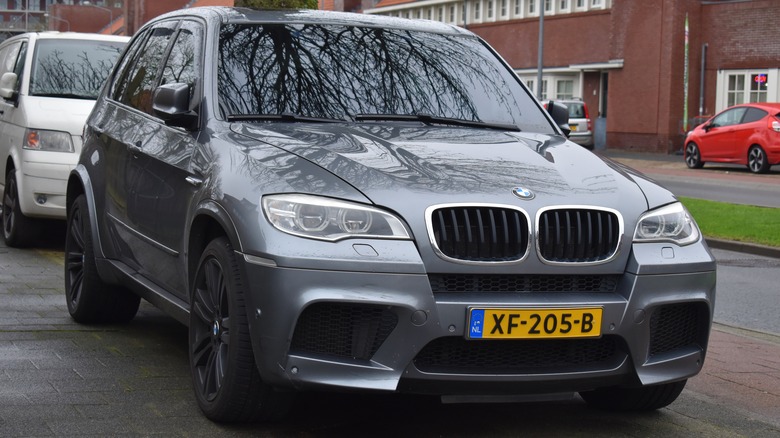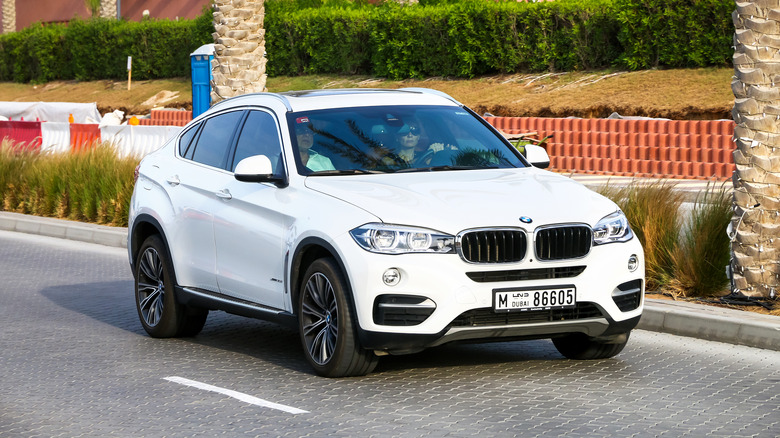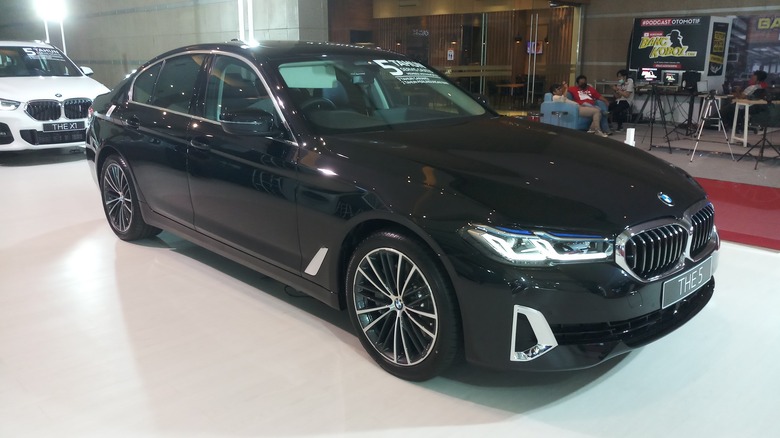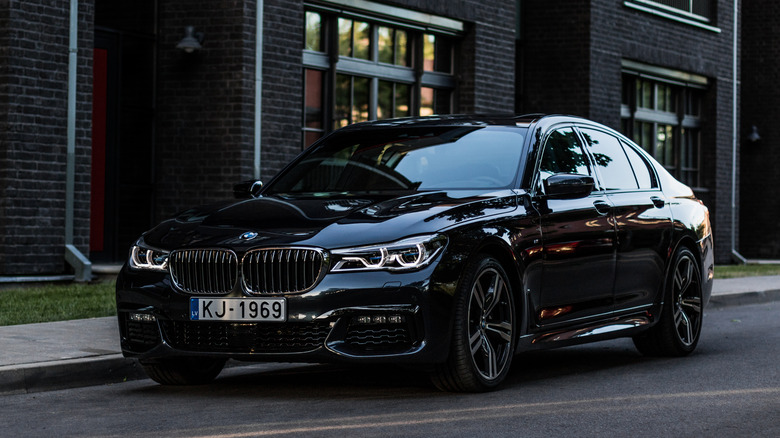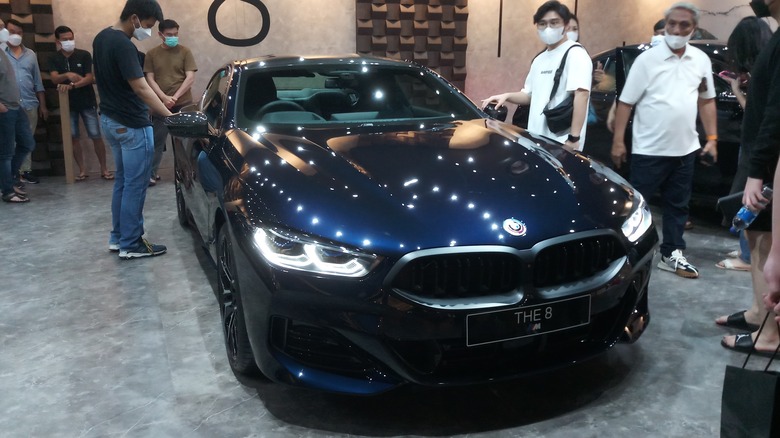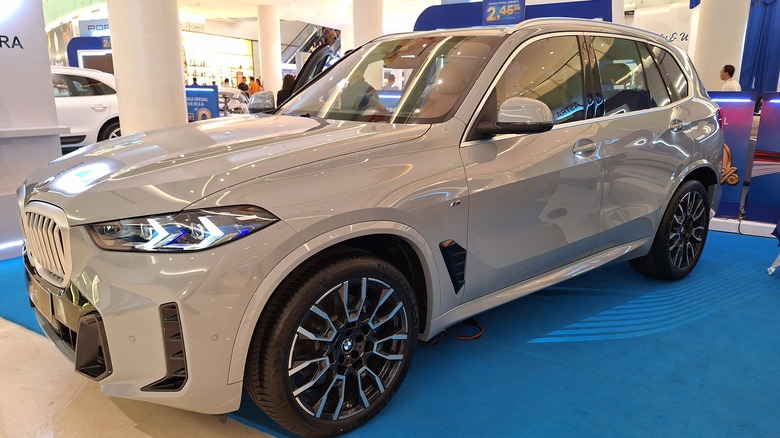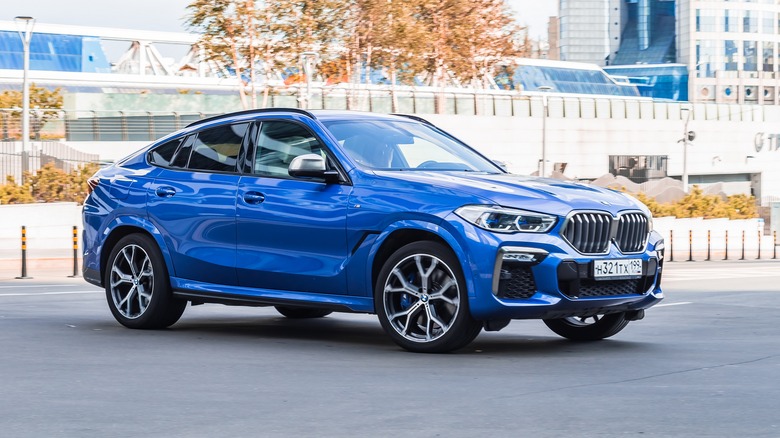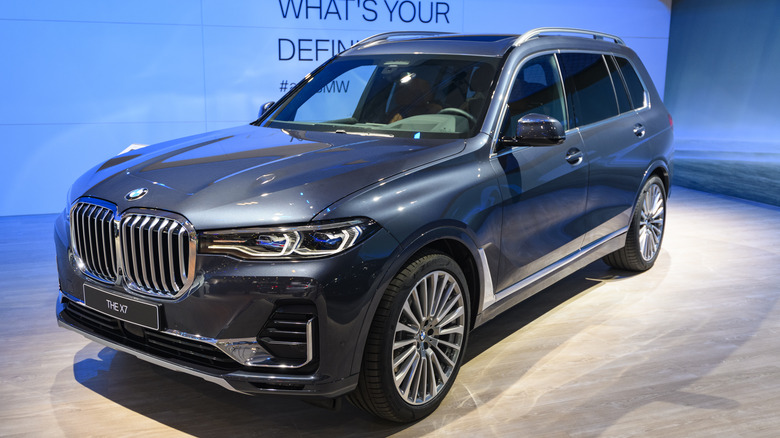Every BMW Model Powered By The N63 Engine
BMW, like many other automotive companies, has a wide array of its own in-house engines. One of these is the N63, an engine that has been in use since 2008 and still makes its way into new models today. Unfortunately, this engine has often received poor feedback from drivers, leading to a general consensus that staying far away from it is the right move — especially its early iterations. The N63 has gone through multiple changes and improvements over the years, though, so there's a bit more to the story than the overall design simply being bad.
For some, knowing about which BMW models have this engine is useful in the same way as knowing every Ford model powered by the 5.4-liter V8, another engine drivers view poorly. It can help you steer clear of troublesome cars on the secondhand market and know beforehand how much maintenance may be required for an older model. But knowing about these different cars can also make their historical improvements clear. Looking at every BMW powered by the N63 doesn't just show why the engine received such a poor reputation, but also why it continues to stay in production even today.
There are other variations of the same engine under different names, such as the S63. For the sake of simplicity, this article will only focus on car models using engines with the actual N63 naming scheme.
F10 BMW 5 Series
The BMW 5 Series didn't have a very long run, but it had the N63 under the hood for the whole time it was in production. From 2011 to 2016, the F10 550i sedan in this series — one of a number of BMW cars that didn't make it to the United States — had two versions of this engine. Each one was able to reach over 400 hp, which was actually on the low end for the N63. Between this and a 0-60 mph time of just around 4 seconds, this sedan is staggeringly impressive from a standpoint of numbers alone.
Unfortunately, the F10 is also a prime example of the N63's shortcomings. Earlier versions of the engine had major issues including high oil consumption and poor reliability, and in the F10's case, a myriad of other issues hurt the car's credibility even further in the eyes of many. Even after the engine was updated in the 550i, there were still reports of oil pump gasket leaks alongside other unrelated issues with sensors and the parking camera. It's hard to argue with the N63's use in the F10 550i representing one of the lowest points of its history.
F12 BMW 6 Series
The BMW F12 also made use of the N63 engine, though in this case, it was only present in the 650i models. It had the same impressive horsepower numbers as the F10 and even managed to last for a longer period of time, being in production from 2011 to 2018. This car's reputation is much more positive overall, as well, with community members praising its comfort and power. They still advise potential buyers to be careful with the N63, but this seems to be a non-issue as long as you go for the updated engine from 2013.
With the F12 being discontinued in 2018, the engine would go on to be used in other models. However, recent reports have noted that BMW might be reviving the entire 6 series. This revival would allow the cars to have a wider array of powertrain options, including choices for hybrid and fully-electric vehicles. Whether or not this revival would also bring the N63 back as one of the options is unknown, but it's not entirely out of the question. After all, BMW hasn't stopped making the engine even today.
F01/F02 BMW 7 Series
Although there are plenty of cool features in the 2023 BMW 7 Series, the lineup's beginning — as well as its use of the N63 — goes quite a bit further back. It's one of the earliest examples of a BMW car to use the N63, being present from 2009 to 2015. During this period, it was found in both F01 and F02 models, pushing their horsepower as high as 450 in later years. The engine performed similarly to the one in the F10 in terms of impressive numbers, but it also shared a number of problems.
Because of when the F01 and F02 models used the N63, the engine's early issues were even more pressing. These days, any praise for the car from BMW fans is quickly drowned out with warnings and complaints about its long-term reliability, stemming from issues with injectors and cylinders. Its terrible reputation also comes from its hair-raising costs, with maintenance often requiring more money than a used model would be priced at in the first place. Simply put, if you're looking for the best reliability the N63 can offer, you will not find it in these early 7 Series models.
E70/F15 BMW X5
The BMW X5 first found the N63 engine under its hood with the E70 model in 2011. This was one of the shortest runs of the engine, only lasting until 2013 thanks to the updated variant only being used in different X5 models. As one might expect, this means the E70 only ever offered the original version of the N63, with few other options than the E70 X5 M's S63 engine. Of course, this did a lot for how people saw the E70 — and not in a good way.
Practically all modern discussions on the E70 are negative, and the engine's failure rate thanks to faulty injectors is a big part of that. The period from 2011 to 2013 has the highest number of complaints of any X5 model, with many references to the engine stalling during use. In fact, we even ranked the 2011-2014 X5 as one of the most unreliable used BMWs out there. The E70 is the best example of why the N63 engine is so despised today.
Luckily, the F15 iteration of the X5 — lasting from 2014 to 2017 — doesn't have these problems, boasting far greater reliability thanks to the updated engine. While there are some notable differences between the two vehicle models, they biggest difference is simply how much the N63 has improved since then. While you might want to stay far away from the E70, the F15 deserves much more consideration.
E71/F16 BMW X6
The BMW X6 goes even further back with the N63 engine than the F01 and F02, with the E71 model having it as early as 2008. This puts it in a similar situation to the E70, though its negative reception isn't as widespread as its X5 counterpart. Starting in 2014, the model would be changed over to the F16, which would proceed to be in production up until 2017. The differences between these two models are even less noteworthy than the differences between the E70 and F15 outside of the engine's improvements.
While these vehicles — and the N63 in them — escaped the wider scrutiny of the earlier X5 models, that doesn't mean the issues weren't present here. Long after its production, the E71 received extended warranty on its fuel injectors, showcasing a period of unreliability. The F16 has also come under fire from the community for having poor gas mileage, though many drivers acknowledge the updated engine's newfound worth regardless. Still, it would at least take one more revision before the X6's use of an N63 could be praised by all.
G30 BMW 5 Series
Though the F10 wasn't in the best position, BMW pushed ahead with the 5 Series and introduced an even better version of the N63 engine in the brand-new 2017 G30. This new engine is generally held in high regard, falling victim to just about none of the older N63 problems. The release of this car marked a turning point in the overall reputation of the engine, becoming far more positive than it ever was. Its poor beginnings might have left a sour taste in people's mouths, but you can safely rely on just about any N63 found in BMW's G models.
In terms of performance, the new engine showcased even greater numbers than its predecessor. Later models, such as the M550i of the 2021 BMW 5 Series, could reach over 500 hp. It also managed to last for quite some time, making it as far as 2023 before the company started putting more focus on EVs. The G30 was one of the first cases of the N63 truly managing to shine, and thankfully for the engine, it wouldn't be the last.
G11 BMW 7 Series
Following the shortcomings of earlier 7 Series models, BMW revitalized the lineup with the G11 in 2016. Like the G30, this version had even better variants of the N63, and it would proceed to find use all the way through to 2022. Also like the G30, the horsepower of this model skyrocketed beyond the original N63's already impressive numbers, hitting well over 500 by its final year. It still receives a bit of criticism for a lack of reliability, but these complaints are about as minor as they can get compared to how they were before.
As far as direct comparisons go between the vehicle models themselves, it's pretty clear that the G11 wins out over the F01/F02. Between its appealing aesthetics and modernized technology, there are a lot of positives for BMW fans to enjoy without needing to worry about engine issues. If you're able to handle the $80,000+ price point, there are far worse choices you could make than the G11.
G15 BMW 8 Series
Introduced in 2018, the G15 BMW 8 Series is notable for a number of reasons. Firstly, it takes the name of a lineup of cars released back in the early '90s, one of which earned our label as one of the most underrated BMWs ever made. Secondly, it's among the few BMW models to still offer a version of the N63, with even the 2025 model year having the engine. The other models featuring improved N63s were able to make it past 2020, but now only two coupes — one being the G15 — continue to offer this engine as an option.
Reviews of the G15 are very positive, with praise being given to the most recent model for being both smooth and fast. Its horsepower still hits the over-500 mark boasted by the new version of the N63, and it's still absurdly expensive with a cost of over $90,000. There are a few scattered complaints regarding the M850i, but once again, this pales in comparison to the horrible reception of older models.
G05 BMW X5
BMW's G05 X5 is another one of the few examples of the N63 engine powering a modern vehicle, though brand-new iterations of the car don't include it now. When the engine moved on from the F15 in 2018, it continued to be present in the SUV up through 2023, afterward being replaced by a similar — but even more powerful – 600-plus horsepower engine. Even so, the models with the N63 are held in the same generally high regard as other models with this newer version. Even a few model years ago, the 2020 BMW X5 M50i's 530 hp was still some remarkable strength in an SUV.
As far as reliability goes, the G05 X5 has had a fairly wide range of recalls. However, of these recalls, only one had anything to do with the engine, and that was regarding a fuel pump not being properly attached. This was hardly an issue with the N63 alone, and no further widespread problems have been reported. The G05 X5 is the last BMW SUV to have this engine, and it's one of the best choices you can make if you want a version for yourself.
G06 BMW X6
While it got a bit of a later start than the G15, first appearing in 2019, the G06 BMW X6 is the only other coupe from the company to offer an N63 engine in new model years. There's not much that can be said about it that hasn't said before, between its 523 hp capability and modernized technology, but it's still worth mentioning to make a point of where the N63 is today. Considering the engine's abysmal beginnings, it's surprising that any version of it continues to be available.
Other modern versions of the X6 boast versions of the engine without the N63 label. The Hamann BMW X6 M uses a similar engine to more recent X5 models, having the same capacity but boasting far more horsepower. In spite of this, community reception of the G05 X6 with this engine is still positive, with none of the warnings plaguing older models with N63 engines. If BMW continues to use the N63 in future models like this, perhaps its newfound reliability will eventually overshadow the poor reputation it built before.
G07 BMW X7
The G07 BMW X7 is the only other SUV to have received the newer version of the N63, starting from its 2019 model year. Thanks to a special version of the X7 known as the Alpina XB7, it's also the only SUV to continue offering the engine today. This version of the engine is even more impressive than all others, reaching as high as 631 hp with a blazing-fast 0-60 mph time of 3.9 seconds. While the standard of the N63 has stayed the same since its rework in 2018, this is where it's reached the absolute peak of its potential.
On top of being the most powerful N63-powered BMW, the Alpina XB7 is also the most expensive. Nearly $150,000 is a high asking price even for luxury-minded buyers, making it hard to recommend even if you're an avid BMW fan. Still, there's no question that the N63 under its hood is one of the strongest engines you'll find out there, not just in BMW's lineup. If that's enough for you, it might just be worth personally witnessing how far this engine can go.
